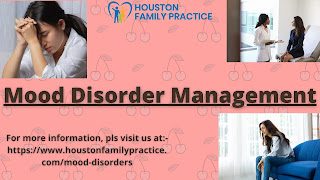All You Need to Know About Mood Disorder Management for Children and Adolescents
Mood disorders, also referred to as affective disorders,
including mental health issues like depression and bipolar disorder. Your
child's emotional state is shaped by a significant change in mood in any of
these diseases. A mood disorder entails intense, challenging to control, and
persistent thoughts and feelings as opposed to a child's occasional, natural
bad mood. A child won't likely "get over" a mood problem on his own;
it is a true medical illness. This is why mood disorder management is important.
The most underdiagnosed health issues in children, in the
opinion of physicians and researchers today, are mood disorders. Undiagnosed
mood disorders can increase a child's risk for other issues, such as disruptive
behavior and substance use disorders, that persist even after the mood problem
has been addressed. The signs of a mood disorder in children and adolescents
are frequently different from those in adults. Since a child may find it
difficult to express his or her thoughts or feelings, it can be challenging for
parents to spot a problem in their child.
The following are
the most prevalent mood disorders in kids and teenagers:
● Major depression: A depressed or agitated attitude that lasts for at least two weeks.
● Persistent depressive disorder (dysthymia): A low-grade, ongoing case of depression or agitation lasting at least a year.
● Bipolar disorder: Periods of consistently elevated mood followed by times when emotions are flat or depressed.
● Disruptive mood deregulation disorder: constant irritation and a significant inability to control behavior.
● Premenstrual dysmorphic disorder: This includes irritation, stress, and depressive symptoms prior to menstruation.
● Mood disorder due to a general medical condition: Depression symptoms can be brought on by a variety of medical conditions, such as cancer, injuries, and chronic illnesses.
●
Substance-induced mood disorder: symptoms of depression brought on by
drug use, medicine side effects, or exposure to toxins.
Key considerations
Everybody occasionally feels sad or euphoric, but this is not the same as having a mood condition like major depressive disorder or bipolar disorder. Mood disorders are long-lasting episodes of sadness, elation, or irritability that, when combined with other symptoms, give the person significant distress and interfere with everyday activities, frequently leading to social and professional challenges.
Whether it's mood
disorder management, management of hypertension, or birth control prescription near me, it is advisable to speak with Houston primary care doctors for
better advice.
Get in touch with
Houston Family Practice
Anyone, including children, adolescents, and adults, can be
affected by mood disorders. The primary care doctors at Houston Family Practice can assist you with mood disorder management.



.jpg)

Comments
Post a Comment